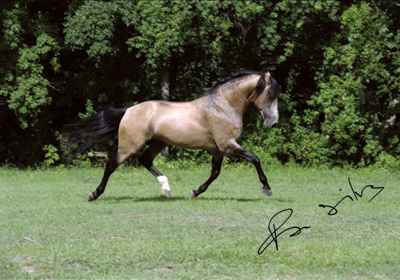ALIMENTAÇÃO
|
ALIMENTAÇÃO |
|
|
Alimentar ou não |
To feed or not to feed
(from: Rashid Newsletter 03/99)
Over the years I have gotten to see a great many horses who had
what could be considered, feed related problem behavior. What I mean by 'feed
related' problem behavior is any negative behavior that the horse is exhibiting
that has been brought on specifically by the amount or type of feed that they
are getting on a daily basis.
These problems could include not standing still to be mounted, groomed or bathed;
pawing in the trailer, jigging on the trail or in the arena, head shaking, tail
wringing, bucking, kicking, refusal to stop or pay attention to even the simplest
cues while under saddle or on the ground; charging forward or bad manners while
being led, showing aggressiveness at feeding time and any number of small or
large behavioral problems that seem uncharacteristic for the horse. These problems
usually escalate into much bigger problems for both horse and rider. Such as
the rider finding him/herself constantly trying to correct the problem (often
using force) and the horse responding by becoming defensive and untrusting.
Usually by the time the horse is brought to me the problems have become so bad
that the owner is actually considering selling the horse and buying one that
is 'problem free'. The only problem with that idea is that the owner will more
than likely start feeding the new horse just as they did the former one, and
the same or similar problems will start to develop all over again.

photo: P. da Silva
I think the reason so many people have feed related troubles with their horses is that they simply don't understand what the horse's daily feed requirements are, and so they end up over feeding in the form of too much hay and grain. So what I would like to do in this issue of our newsletter is to hopefully help folks understand:
A) What a horse needs in the way of feed on a daily basis.
B) How the horse uses the feed they are getting.
By understanding how the horse uses the feed they take in, perhaps
some of the feed related problem behavior could be eliminated.
Well, let's start by saying that there are six different nutrients that a horse
needs to get by from one day to the next. They are water, carbohydrates, fats,
protein, vitamins and minerals.
Water is the most important nutrient and the amount of water needed by a horse
during the day will vary from 5 - 25 gallons. Temperature, humidity, moisture
content of the feed and exercise will all play a part in the amount any horse
will drink on a per-day basis. A good rule of thumb is to always have an ample
supply of clean water available at all times. In the winter, try to make sure
to use a tank heater whenever possible, or that streams or ponds that are water
sources are open continually. The horse will drink as much or as little as he/she
needs.
Vitamins play many roles in the body, but are usually catalysts for metabolism.
In general, a balanced diet of good grass pasture or high quality hay, either
grass or alfalfa will provide adequate amounts of vitamins. If you think for
some reason your horse is deficient in vitamins, it's usually a good idea to
have your feed tested to determine what vitamins are missing, then supplement
accordingly rather than simply giving vitamins haphazardly.
The mineral content in a horse's diet is determined by the contentin the soil,
water and feed. The major minerals include calcium, sodium, chlorine, phosphorus,
magnesium, sulfur and potassium. A good source of minerals is a trace mineral
block to which the horse would have free access.
Now we get to the nutrients that seem to cause the most confusion and the most
problems. Protein, carbohydrates, and fat.
First, let's talk about protein. Now most folks are under the impression that
an overabundance of protein in a horse's diet is what causes problem behavior
in horses. Actually, that isn't necessarily true. Protein is actually used for
growth, lactation, repair of body tissues in case of injury, reproduction, and
bone, skin, muscle and hair development. Now protein can be converted to energy
if the horse is deficient in some way, but the process to convert it is very
inefficient. So, protein isn't usually the cause of problem behavior in horses.
Well, how about fat then? Well, believe it or not, fat is actually the most
concentrated source of energy in a horse's diet. However, due to the way it
is metabolized in the body, it adds energy without making the horse 'hot'. So,
while adding fat such as vegetable oil, corn oil, soybean and the like will
usually improve skin condition and hair coat, it seldom causes problem behavior
in a fit horse.
© do site "A Cavalo!", proibida a reprodução
total ou parcial de textos e imagens.
Toda e qualquer utilização abusiva destas imagens ou textos será penalizada
por todos os meios legais ao alcance dos autores.